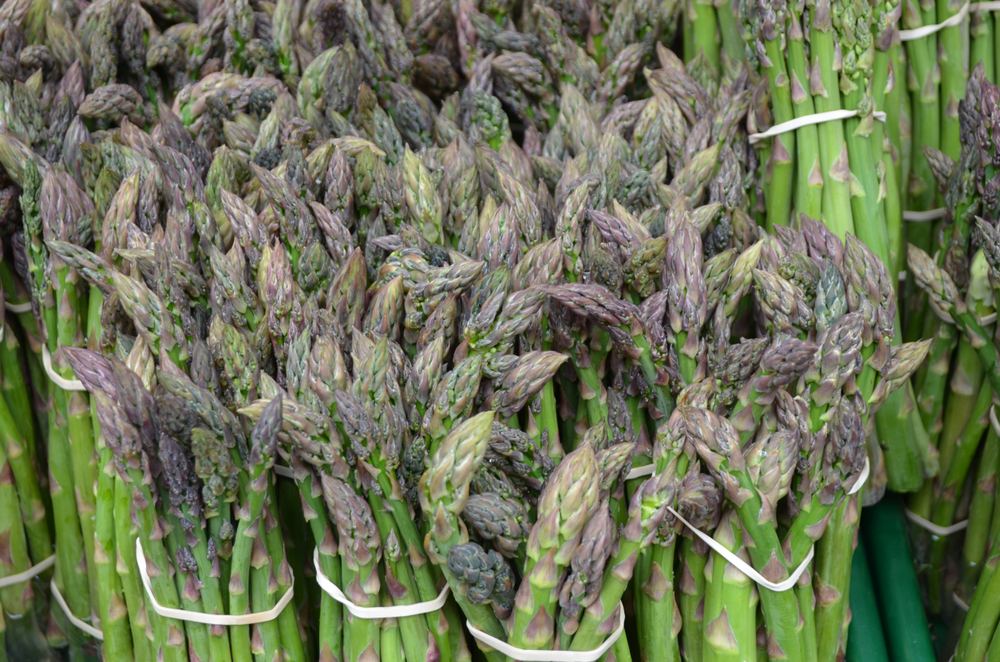This piece is to remind readers of some very good foods now in season in the UK and the benefits of local and seasonal eating.
If ever there was a time for sustainable farming to be incentivised, it is now.
Click on the highlighted items for Sherbhert recipes ideas and other information.
The recent dry spell of weather means that Asparagus has come early this year. This early start will hopefully mean a slightly longer season to enjoy a, usually, short-lived treat.
Also appearing are Jersey Royals and other New Potatoes, Salad leaves, Radishes, Spring Onions and Rhubarb. There are still lots of Leeks, cauliflowers and beetroots too. And coming soon will be bunched carrots, artichokes, fennel, dill and broad beans and of course all the summer berries.
If you are not lucky enough to grow your own, find the best of these things you can at a Farmer’s Market, Farm Shop or in a UK sustainably grown vegetable box scheme if you can. These food sources are likely to be cheaper and better quality than those from a supermarket. You will help the environment by shopping this way.
Lamb is tender and delicious now and is good with mint which is plentiful. Sustainably caught Crab Plaice and Sea trout are also available and can be perfectly accompanied by Asparagus and Jersey Royals.
Now there is also Farms to Doors a new online source of excellent foods. This is a collection of farmers, fishers and vegetable growers who got together following the sad demise of Farmdrop in December last year. Farms to Doors now deliver across the UK.
And don’t forget foraged foods which are a growing trend. See Foraged Foods in these pages for more on these ancient flavours.
Our nation’s obesity problem continues to make headlines and does not seem to get anywhere near resolution. In fact, the pandemic arguably put things in reverse, with the likes of Deliveroo now entrenched with fast food chains. This increases consumption of heavily processed food. Whilst the National Food Strategy report is recommending a tax on sugary and salty processed food, that may well not happen until 2025. That is a long way off and may not even help. Rather than wait for legislation we need to act now to help ourselves. A good start would be to cook from scratch, avoid buying ready-processed meals, and so avoid foods with a high sugar and salt content. Have a look at food labels, you will likely be amazed by how much salt and sugar is included and, worse, how many of the ingredients are not recognisable as food.
Limited to a diet of predominantly fresh food (and that includes freshly frozen foods and some canned foods) we will feel noticeably better, have more energy, think more clearly, sleep better and are highly likely to lose weight or at least maintain a steady weight. Cooking and eating this way is also likely to mean we waste less and probably save money too.
Having said all that, we shouldn’t demonise all salt. There is a world of difference between so-called table salt and good quality sea salt flakes. A healthy diet for adults can include up to 6g of sea salt flakes each day which is more than enough for most. But it is an important part of our diet, and it is a fact that many good foods need only a tiny scattering of good sea salt flakes to shine.
Current global food shortages could give UK farming a boost. It certainly should.
If you are interested in better understanding the recent history of farming in this country, please do look to English Pastoral an Inheritance by James Reebanks, an excellent read or listen which is likely to leave you wanting more.
See also:
Non-food, Obesity and Mortality – Time for a National Diet Strategy
UK Food Supply – Farming is Essential
Sherbhert champions ethically and sustainably produced seasonal and as often as possible local food, not least because it is fresh and delicious but also because:
- It reduces the energy needed to grow and transport food
- It is good for the health of the soil
- It avoids the premium paid for foods that are scarcer and have travelled long distances
- It supports local economies
- It connects us with nature
- It reduces both food and packaging waste
- It is value for money
- It is a natural way to achieve a varied, balanced and nutritious diet
- Foods taste so good that only a few ingredients are needed to make something truly delicious – just be sure to use every last scrap of it.
If you are interested or maybe confused about food and what to eat or not eat for a healthy diet, have a look at “Food Rules” by Michael Pollan. This easy-to-follow book of simple food rules makes so much sense and it’s a short read.

